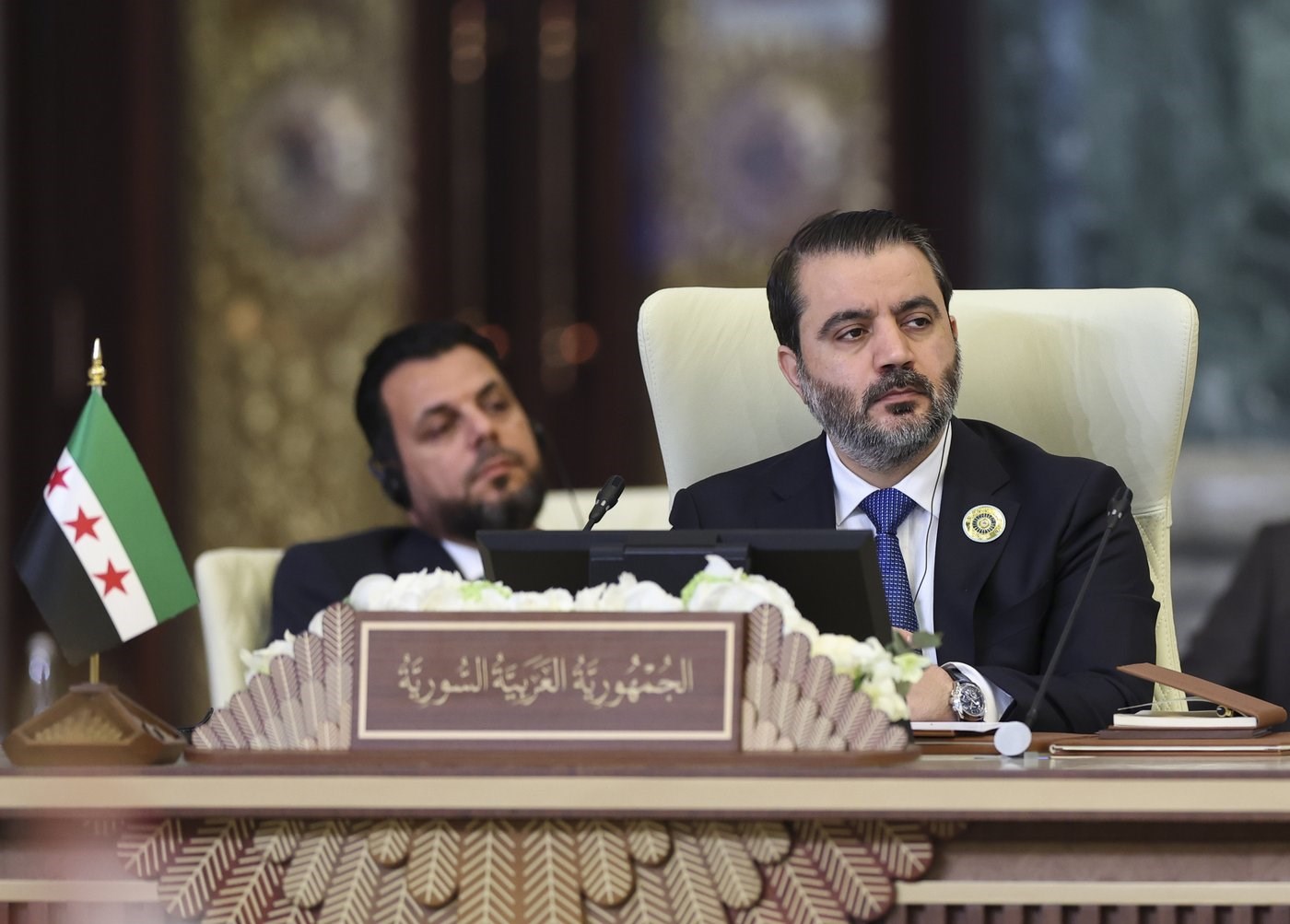
Syrian Foreign Minister Asaad al-Shibani attends the 34th Arab League summit, in Baghdad, Iraq, Saturday, May 17, 2025. (Thaier Al-Sudani/Pool via AP)
Republished May 23, 2025 - 7:37 PM
Original Publication Date May 22, 2025 - 9:11 PM
WASHINGTON (AP) — The Trump administration granted Syria sweeping exemptions from sanctions Friday in a big first step toward fulfilling the president's pledge to lift a half-century of penalties on a country shattered by 13 years of civil war.
While broad, the administration's actions could possibly be reversed. Syrians say they need permanent relief to secure the tens of billions of dollars in investment needed to rebuild after a conflict that fragmented the country, displaced or killed millions of people, and left behind thousands of foreign fighters.
A measure by the State Department waived for six months a tough set of sanctions imposed by Congress in 2019. A Treasury Department action suspended enforcement of sanctions against anyone doing business with a range of Syrian individuals and entities, including Syria’s central bank.
Syria is now led by Ahmad al-Sharaa, a former militia commander who helped drive longtime autocratic leader Bashar Assad from power late last year.
President Donald Trump announced last week that the U.S. would roll back the heavy financial penalties in a bid to give the interim government a better chance of survival.
The Trump administration said businesses and investors are getting the protection against sanctions they need to come back to Syria, calling it “the opportunity for a fresh start.”
“The only other option was Syria becoming a failed state and civil war,” said Mouaz Moustafa, a Syrian American advocate who had campaigned for quick, broad relief. “Now there is hope for a future democratic Syria.”
The congressional sanctions, known as the Caesar Syria Civilian Protection Act, had aimed to isolate Syria’s previous rulers by effectively expelling those doing business with them from the global financial system. They specifically block postwar reconstruction, so while they can be waived for 180 days by executive order, investors are likely to be wary of reconstruction projects when sanctions could be reinstated after six months.
The Trump administration said Friday's actions were “just one part of a broader U.S. government effort to remove the full architecture of sanctions." Those penalties had been imposed on the Assad family for their support of Iranian-backed militias, their chemical weapons program and abuses of civilians.
Trump administration says it expects action from Syria
Secretary of State Marco Rubio said in a statement Friday that in return for sanctions relief, Trump expects “prompt action by the Syrian government on important policy priorities.”
Al-Sharaa’s own past has fueled doubts. The group that he led, Hayat Tahrir al-Sham, was originally affiliated with al-Qaida, although it later renounced ties and took a more moderate tone. It is still listed by the U.S. as a terrorist organization.
But if al-Sharaa’s government fails, the U.S. and others fear renewed conflict in Syria and a power vacuum that could allow a resurgence of the Islamic State and other extremist groups.
“If we engage them, it may work out, it may not work out. If we do not engage them, it was guaranteed to not work out,” Rubio told lawmakers this week.
Trump met al-Sharaa last week in Saudi Arabia, a day after announcing his intention to lift the sanctions: “We’re taking them all off. Good luck, Syria. Show us something special.”
Rubio said sanctions relief must start quickly because Syria’s transition government could be weeks from “collapse and a full-scale civil war of epic proportions.”
But asked by lawmakers this week what sanctions relief should look like overall, Rubio gave a one-word explanation: “Incremental.”
Moving toward permanent sanctions relief
While some sanctions can be quickly waived through executive actions like those taken Friday, Congress would have to permanently remove the penalties it imposed.
A proposal circulated among administration officials this week broadly emphasized taking all action possible, as fast as possible, according to U.S. officials familiar with the plan who were not authorized to comment publicly and spoke on condition of anonymity.
Last week, a State Department proposal laid out a three-phase road map with temporary, partial relief initially and setting sweeping conditions for Syrians to meet for any future phases of relief or permanent lifting of sanctions, one of the officials said.
Removing “Palestinian terror groups” from Syria is first on the list of conditions to get to the second phase. Supporters of sanctions relief say that might be impossible, given the subjectivity of determining which groups meet that definition and at what point they can be declared removed.
Other conditions for moving to the second phase are for the new government to take custody of detention facilities housing Islamic State fighters and to move forward on absorbing a U.S.-backed Kurdish force into the Syrian army.
To get to phase three, Syria would be required to join the Abraham Accords — normalized relations with Israel — and to prove that it had destroyed the previous government’s chemical weapons.
Israel has been suspicious of the new government, although Syrian officials have said publicly that they do not want a conflict with Israel. Since Assad fell, Israel has launched hundreds of airstrikes and seized a U.N.-patrolled buffer zone in Syria.
___
Sewell reported from Beirut. Associated Press writers Matthew Lee and Fatima Hussein in Washington contributed to this report.
News from © The Associated Press, 2025